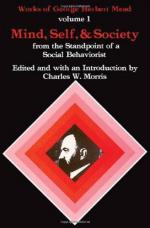|
This section contains 4,974 words (approx. 17 pages at 300 words per page) |

|
SOURCE: "In Search of Self in a Moral Universe: Notes on George Herbert Mead's Functionalist Theory of Morality," in Journal of the History of Ideas, Vol. XLV, No. 1, January-March, 1984, pp. 153-61.
In the following essay, Karier maintains that despite Mead's secular outlook, "he nonetheless depended heavily on certain key assumptions from his Christian past with which to fashion his new secular liberal reformist view of the world. "
George Herbert Mead was born and reared in a heavily saturated Christian environment. His father was a clergyman who taught homiletics at the Theological Seminary at Oberlin College, and his mother was educated at the Seminary at Ipswich, Massachusetts. His best friend during his adolescent years was Henry Castle, the son of American missionary parents in the Hawaiian Islands. In 1891, when Mead gave up his student life and joined John Dewey at the University of Michigan, he married Henry's sister, Helen...
|
This section contains 4,974 words (approx. 17 pages at 300 words per page) |

|


